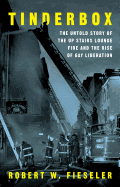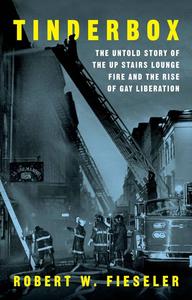
 Until the 2016 gun slaughter of 49 people at the Pulse Nightclub in Orlando, a little-discussed arson case in New Orleans was considered the deadliest attack on a gay bar. On Sunday, June 24, 1973, a fire set on the outside steps of the Up Stairs Lounge caused a harrowing inferno, taking 32 lives. Journalist Robert W. Fieseler salvages this unsettling moment in American history from the edge of forgetfulness in a remarkable, potent remembrance.
Until the 2016 gun slaughter of 49 people at the Pulse Nightclub in Orlando, a little-discussed arson case in New Orleans was considered the deadliest attack on a gay bar. On Sunday, June 24, 1973, a fire set on the outside steps of the Up Stairs Lounge caused a harrowing inferno, taking 32 lives. Journalist Robert W. Fieseler salvages this unsettling moment in American history from the edge of forgetfulness in a remarkable, potent remembrance.
From its outset, Tinderbox distinguishes the Up Stairs fire from other galvanizing incidents in the fight for gay rights. For starters, there is no evidence that this was a hate crime, but rather "most likely... a disgruntled bar patron exacting revenge upon a rival gay clique." Moreover, the Gay Liberation uprising that followed was led largely by outsiders like Troy Perry, founding pastor of the gay-friendly Metropolitan Community Church (MCC) in Los Angeles. The Big Easy fostered a laissez-faire closet for the gay community that many natives feared upsetting; while open homosexuality was despised, the rowdy French Quarter often turned a blind eye to the private liaisons of neighbors.
And it's that very don't-ask-don't-tell atmosphere that makes Fieseler's depiction of a community in crisis so memorable, so stirring. He first crafts an evocative, even romantic, portrait of gay life in New Orleans. Against a sultry summer backdrop, he details the lives of men in their element and men in love: Buddy the Up Stairs bartender ("tall and winsome") and his lover Adam ("a genteel Southern dandy") preparing for the weekly beer bust that evening; Pastor Bill Larson "standing with grace behind the altar" at the MCC chapter that used to gather in the bar; Air Force serviceman Steven Duplantis on weekend leave with his lovers Stewart Butler and Alfred Doolittle. Their lives were irrevocably altered in less than 10 excruciating minutes.
The blind eye of neighbors became maddeningly willful in the aftermath. Newspapers addressed the tragedy obliquely if at all. Neighboring churches turned away MCC's pleas. Civil rights organizations ghosted. Investigators dragged their feet and fumbled evidence. Live and let live turned on a dime to "Did you hear the one about the flaming queens?"
The Up Stairs Lounge fire marks a complicated moment in LGBT history, between 1969's Stonewall riots and 1983--when "about five new AIDS cases were being reported every day in the United States" and the FDA banned blood donations from men who have sex with men, still in effect today. Fieseler handles his subject with deep consideration to historical context. He notes the negative influence the film Deliverance bore on public opinion of homosexuality, and spotlights the inspiring turnout of gay men at blood-drives for burn victims.
It's indescribably moving to learn in a final author's note that survivors hesitant to speak on the record for Tinderbox came forward with urgency after the Pulse massacre. Their testimonies, Fieseler's rigorous research and his amiable prose make this a vital, inspiring volume in the annals of gay history. --Dave Wheeler, associate editor, Shelf Awareness
Shelf Talker: Journalist Robert Fieseler sifts through the ashes of a nearly forgotten tragedy that took 32 lives in a New Orleans gay bar.

